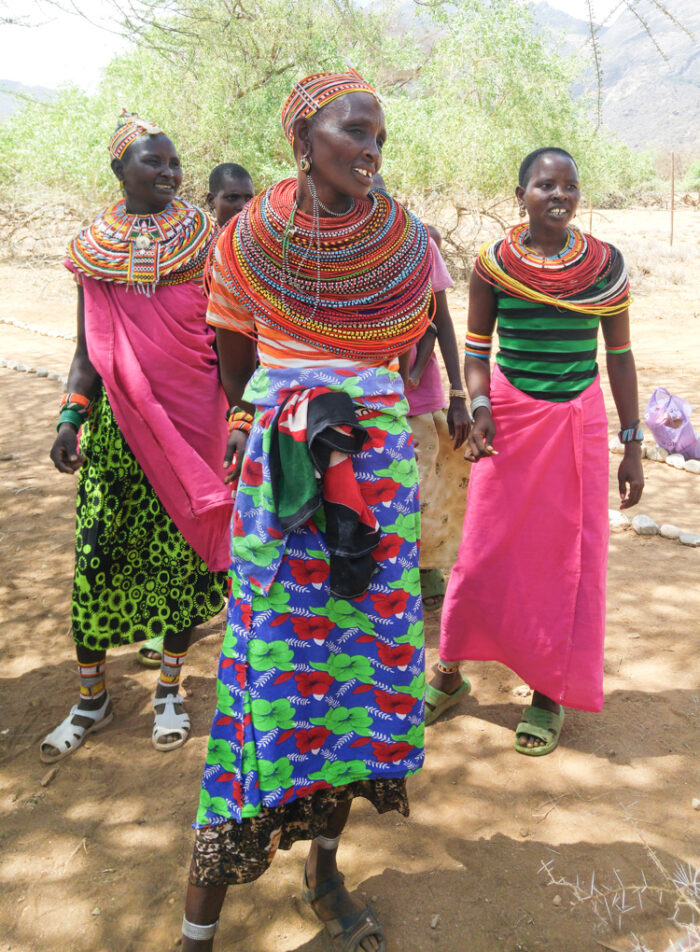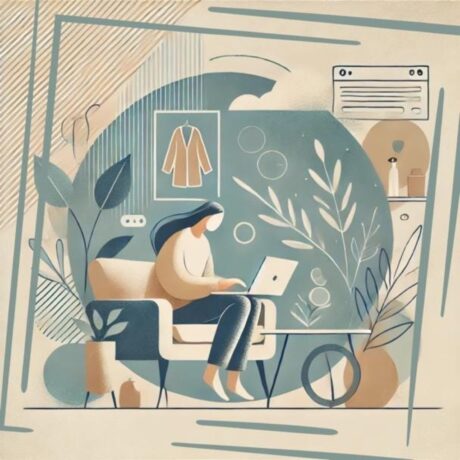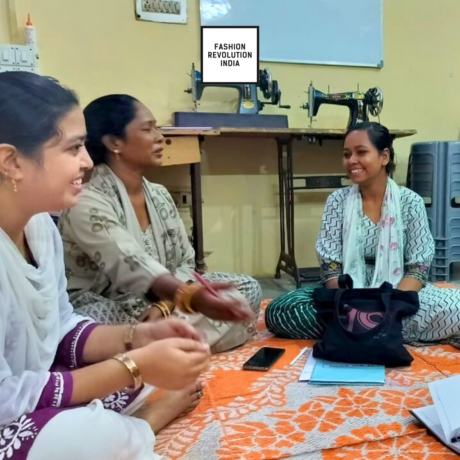#WeMadeYourBaskets: Fashion Revolution Week 2018
Fashion Revolution Week is here again and its mission remains unchanged: to campaign in a positive way for greater transparency in fashion supply chains. For a brand to be able (and willing) to publish details of its supply chains means that they are far more likely to be working ethically: safe, clean and fair. And knowing the true provenance of your purchases empowers you, the consumer, to make fully informed buying choices.
We’re not only willing and able to tell you about where and who our baskets come from – you can’t usually stop us shouting about the weavers and their incredible craft! We visit as many cooperatives as we can throughout the year and we’re in daily communications with most cooperative chairladies during the dry seasons when the weaving steps up a gear. It’s vitally important for us to build relationships and empathy with the people behind our baskets; to hear their stories and to see how they live. We hope that you enjoy hearing their stories, too.
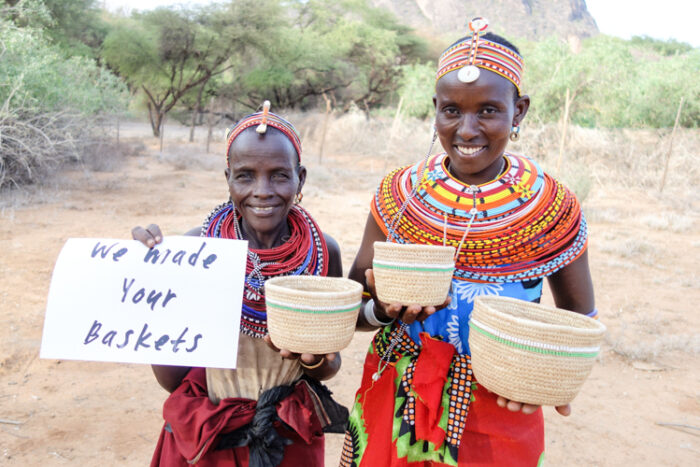
Spoiled for choice as we were for whom to feature in this blog post for Fashion Revolution Week (so many interesting and inspiring people to talk about), we have decided to tell you a little more about a weaver named Ntomulan Lesania, who makes some of our Nomadic Beaded Baskets from her home in rural Ngurunit, Northern Kenya.
Back in March 2017, Camilla headed out to meet the Ngurunit Weavers Group. These weavers are semi-nomadic pastoralists (herding camels, cattle, sheep and goats) known collectively as Ariaal: they don’t belong fully to either the Samburu or the Rendille tribes – Ariaal is a mixture of the two. The Ariaal people are known for their peaceful ways and their openness to compromise, merging characteristics from both traditions – in house building, in bead making and in handicrafts – and speaking the two tribal languages interchangeably.
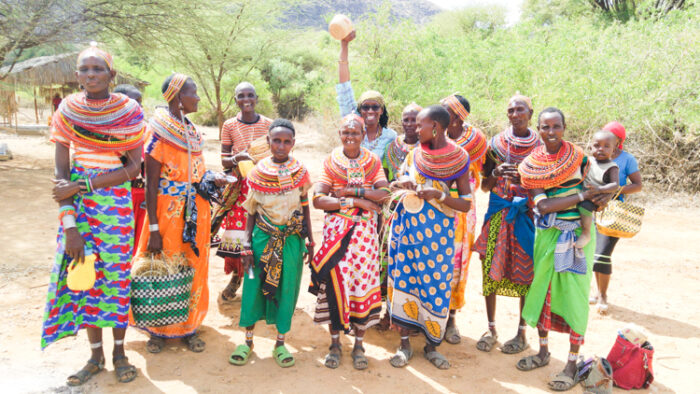
Ntomulan Lesania is a single mother: widowed, with six children aged between 3 and 18. She was her late husband’s second wife, and she had three children before marrying him – and then went on to have three more children with him. Here are some excerpts from Camilla’s interview with her:
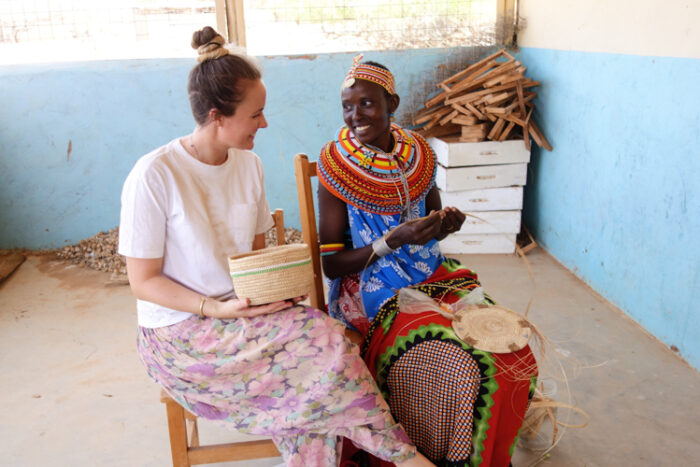
The multi-coloured layers of beaded collars, headdresses and earrings worn by the Samburu women denote not only marital status but also other clues as to a woman’s rank within the tribe. Beads, buttons and sequins in different colours can signify anything from her husband’s wealth to how many sons she has birthed.
Where did you grow up and did you go to school?
I grew up in Ngurunit. I didn’t go to school. Instead, I looked after the animals in my family: goats and camels.
Do your children go to school?
Four of my six children go to school. Two boys, and two girls. The youngest two look after the family animals. I have to pay for them to attend school. Primary school is free, but secondary school is fee-paying.
Not all the children here go to school. Children who are especially good at looking after the animals will usually stay home, whilst their siblings might attend school. Sisters from the same families will sometimes be dressed differently: those who were educated will often wear more Western clothes, whilst their siblings who did not attend school wear traditional Samburu beads.
How do you make the money to pay for schooling?
I make money through basket weaving, and selling livestock, and goat and camel milk. We receive camels when we get married and we invest in livestock when we save enough money. The current drought means that livestock are dying, however. There is more drought in the area than ever before. If there are one or two failed rains, this is considered a drought, and life becomes hard for people and their businesses. Since 2006 there have been no consecutive years without drought. Recovery from a drought can take up to a year.
Life has changed considerably for Ariaal women in recent years. In this rural region of Kenya where milk is precious currency, women are now allowed to own milk-producing camels as well as milk itself. When Camilla visited in March 2017 the drought was very bad and governmental parties were slaughtering cattle to be eaten by their owners, then paying the owners for the value of that animal. This is a scheme called Food Relief, and serves the dual purposes of putting the animals to good use so that they do not starve, and feeding the people without seeing them out of pocket.
How long have you been weaving for and how did you learn?
I saw my older sister weaving, and learnt the art from her. She was only just married at that time, so still a teenager.
How does the income from the weaving help support your family?
The income from weaving helps me to buy food, pay school fees, and pay for school transport.
What makes you happy?
When my kids are around me, and we have no problems. When I am able to feed them all, and when they are happy.
What do you feel would help women to overcome the barriers they face in the working world?
More basket orders. Money helps to solve problems here. We need to earn a living.
Do you feel successful being part of a growing weaving cooperative?
Yes. We are all proud! This group is important to me: it gives me support. I am a single mother, and I get help from my friends. If I have an order to deliver, for example, my friends will help me with the children.
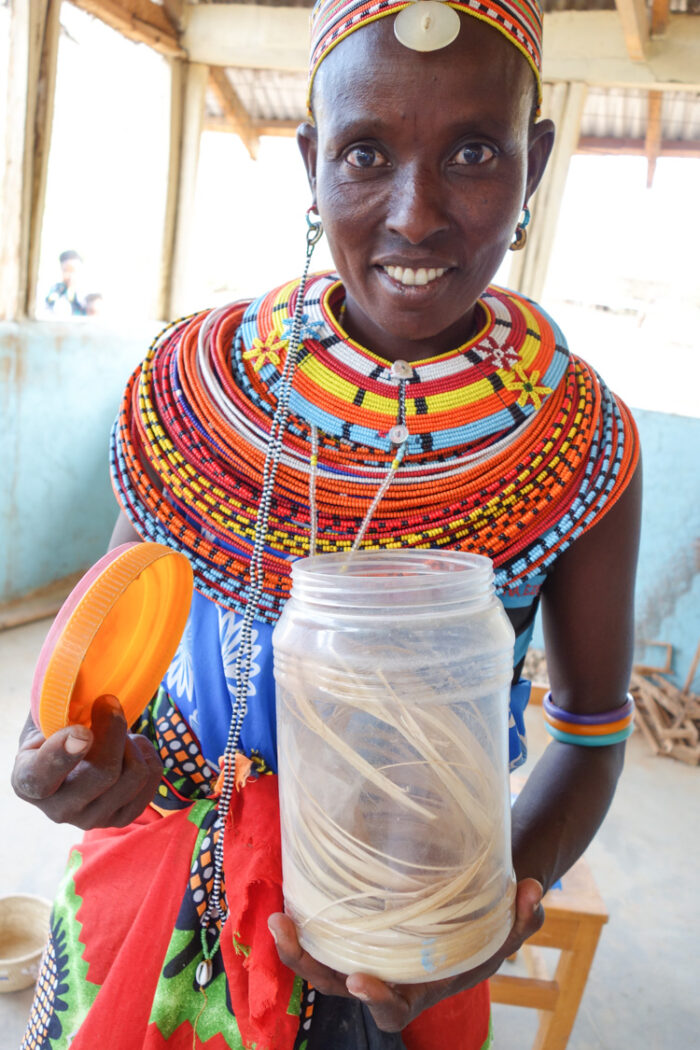
Ntomulan’s woven baskets – the Pambo Palm collection – were traditionally created by the Rendille people as vessels for collecting camels’ milk.
Fashion Revolution Week falls on the anniversary of the Rana Plaza factory collapse, which killed 1138 people and injured many more, on 24th April 2013. During this week, brands and producers are encouraged to respond with the hashtag #imadeyour… (insert product) and to demonstrate transparency in their supply chain.




